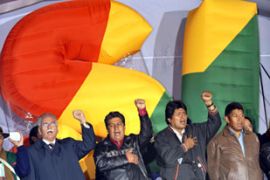Polls close in Bolivia referendum
Voters likely to back changes that would let president Evo Morales to run for second term.

The proposals include a larger state role in the economy, grants of self-rule to 36 distinct indigenous “nations” and a December general election, in which Morales could run for another five-year term.
Voters also decided on whether future land ownership should be capped at 5,000 or 10,000 hectares. The state could seize land that does not perform a “social function” or was fraudulently obtained.
‘Same rights’
“This new constitution of the Bolivian state wants to give everybody the same opportunities, the same rights and the same duties. And there shouldn’t be exclusion anymore,” Morales said in the capital La Paz on Saturday.
| Key proposals |
|
Elections: Presidents would be allowed two consecutives five-year terms |
Morales strong support is likely to see the referendum passed. He won 67 per cent of the vote in a recall referendum in August 2008.
“Evo Morales will win, because he is a good president and he is helping children and old people. So we will vote ‘yes’,” Norita Manami, a Morales supporter, said.
But despite strong support for Morales, the vote could prove divisive with the country split along geographic, racial and class lines.
The opposition, led by state governors in the more prosperous east, has objected to the proposed changes.
Many critics have accused Morales of harming the economy through the nationalisation of a number of businesses.
“This is a false referendum, it does not have the participation nor the support of half of the Bolivian people. We people from the east [the lowlands of Bolivia] don’t expect anything good from it,” Percy Ruiz, an opponent of Morales, said.
However, the opposition allowed the referendum to go ahead after Morales agreed to stand for only one additional term and grant greater autonomy to the regions.
Nearly four million Bolivians were registered to vote in the referendum monitored by international observers.